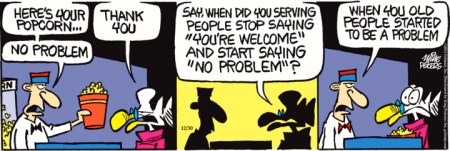Today’s Mother Goose and Grimm:
Mother Goose objects to (what she sees as) an innovation in politeness routines, seeing it as recent (and characteristic of kids) and especially associated with serving people. These criticisms has been leveled by many others.
From a posting of 1/22/14:
the question How are you? and the answer Fine are conventional, idiomatic expressions in social exchanges in English [as opposed to Russian, which wa the main point of this posting]. Taking them literally is a cross-cultural error.
It’s astonishing how much heat is generated by such expressions. The internet is full of venom about two relatively recent ones in the U.S.:
No problem ‘You’re welcome; of course’ [possibly related to Spanish De nada (literally) ‘It’s nothing’]
I’m good ‘No thank you’
People complain bitterly that others don’t use the older expressions. Well, language changes, and idioms are not fully compositional.
More detail from Wikipedia:
No problem is an English expression, meaning “you’re welcome”. It is similar to the Australian English expression no worries. The phrase is used in most of the United States, especially on the East Coast of the United States.
Some find the expression, particularly when employed in the service industry, to be rude, implying that a reasonable request could have been received as problematic or unwelcome.
Well, no problem doesn’t actually mean ‘you’re welcome’; it performs (roughly) the same conversational function as the conventionalized polteness formula you’re welcome does as a response to thank you. The major virtue of no problem is that it is at least partly compositional: it’s fully compositional in some contexts (Could you get me a glass of red wine? No problem.), though extended in usage to a wider class of responses.
Another virtue of no problem is that it can be seen as informal and friendly, in contrast to you’re welcome, which some speakers see as overly stiff and formal. (But not everybody has the same judgments of (in)formality levels.)
But objectors rage. From a CBS Sunday Morning program from 5/27/13:
“No problem”: Yes, it’s a BIG problem
A certain catch phrase is posing a problem for our contributor Bill Flanagan:
When did everyone born after 1980 decide that “No problem” was interchangeable with “You’re welcome”? Who spread that virus? The Taliban?
Listen, today’s young people: If you want to infuriate someone born before 1980, just keep telling him “No problem” when they ask you to do something that is most certainly NOT a problem.
Some facts, from OED3 (June 2007):
no problem colloq. (a) simple, acceptable, not problematic; (b) used to express one’s agreement or acquiescence, or to acknowledge an expression of thanks. [first cite 1955; then 1973, 1985, 1999, 2002]
(a) is compositional, (b) semi-compositional (but an improvement on the entirely opaque you’re welcome). In any case, as usual, it’s not as recent as people are inclined to think. But if you think it’s a recent innovation and is associated with young people, you’ll probably rage about it.

December 31, 2014 at 2:44 pm |
Even caught on in Wales it has. One often now hears from younger (including young adult) Welshmen
“Dim problem>/i>”
‘No problem’
instead of the more usually given
“Croeso.”
‘Welcome”
December 31, 2014 at 10:21 pm |
Hearing “no problem” used to drive me crazy. Now, hopefully (sic), after reading Sage Arnold, I will be a little less annoyed. 🙂